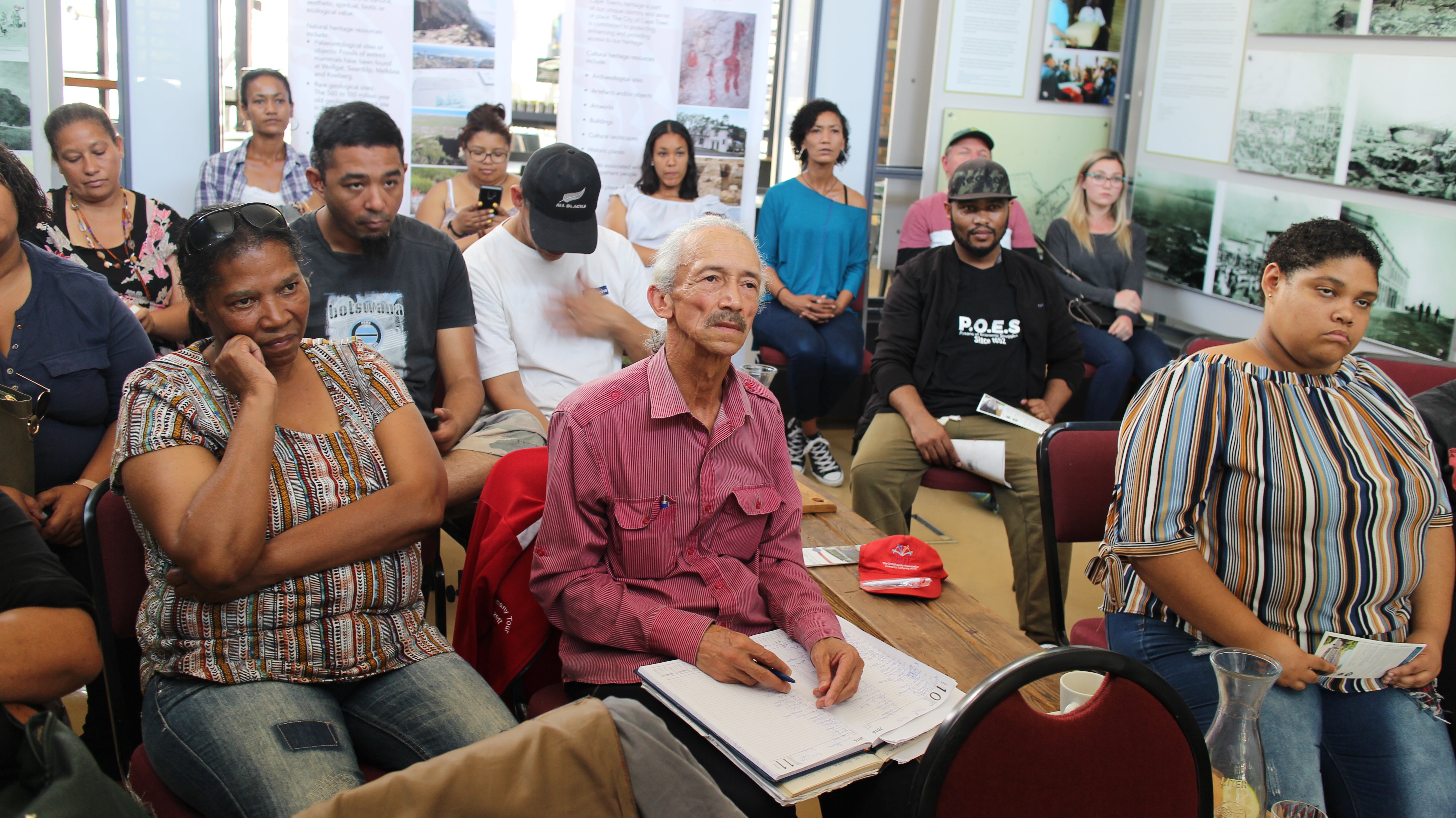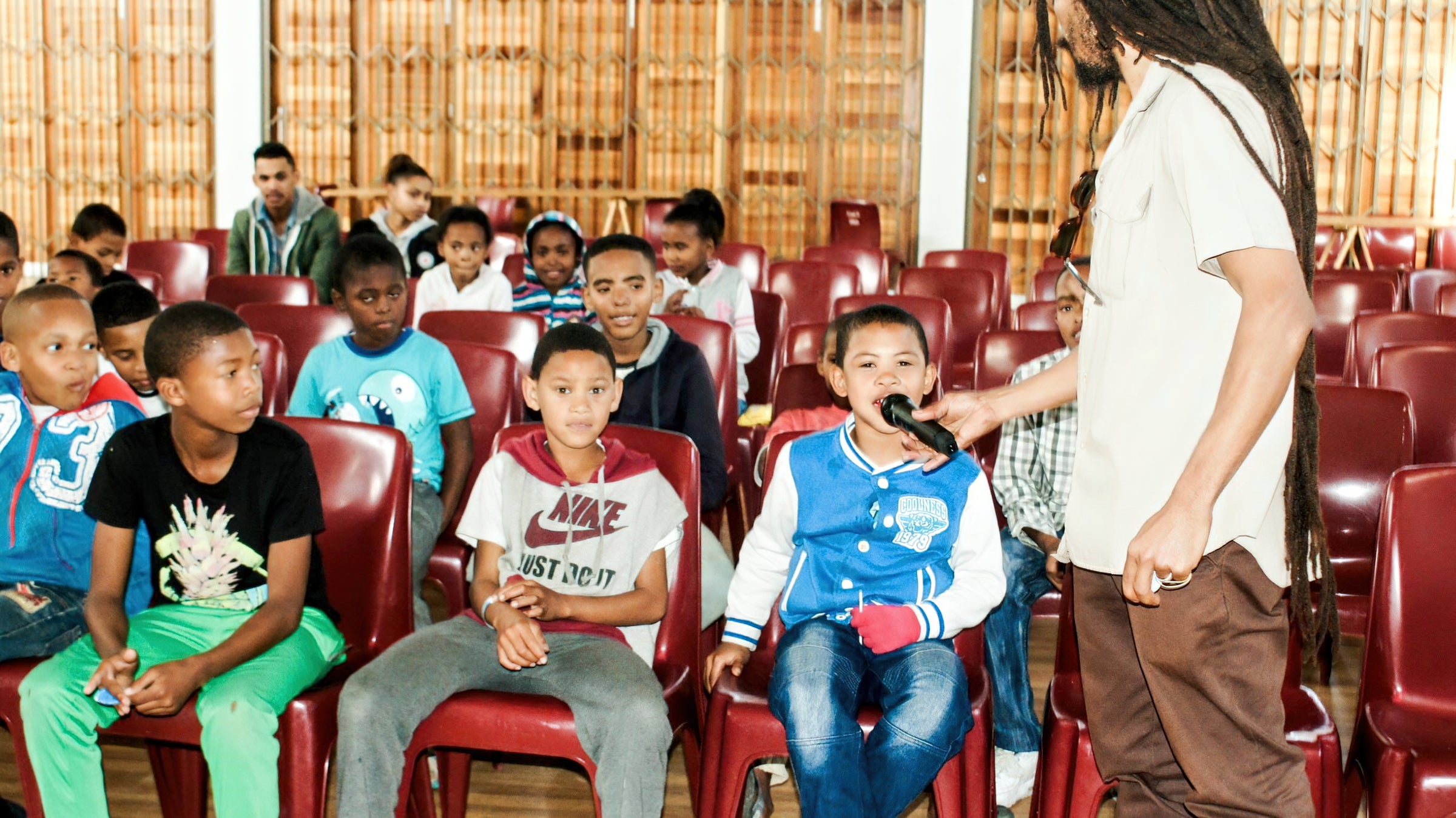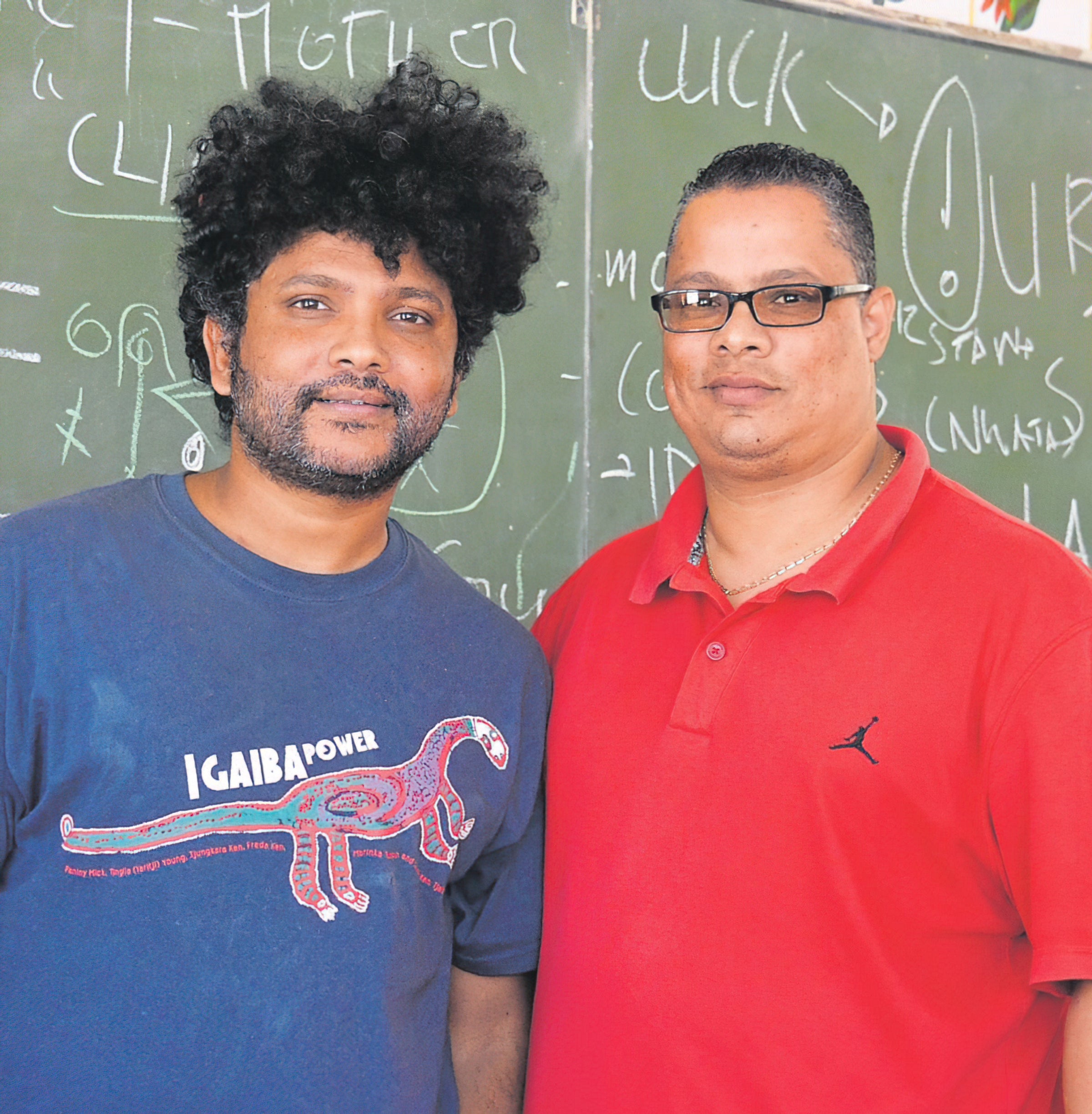Kakapusa, (erasure, or amnesia) in the Khoikhoi language, defines our Khoi reality in South Africa, a nameless country. No other group has experienced such violent systemic erasure on our own lands and with quite such intensity as our Khoi Peoples. It is frightening at times, given that 40 percent of this country is called “the Karoo,” which in Khoikhoi means “dry place.” Indeed, the Karoo is an arid place. So how, then, are we forgotten?
In fact, we never left. A majority “yellowish people” who the colonizers found on this land with an abundance of cattle and land, we are the creators of one of the world’s original tongues. However, today we are gowab-o and !hub-o, without language and without land; our nam (tongues) in the !kho-ommi (prisons) of those we fed, clothed, and healed. Some of the everyday words in South Africa like dagga (cannabis), nai (sex), and kak (shit) are also from our abogan di gowab, or ancestral languages.

Khoikhoi language session, Eersteriver, ǁHuiǁGaeb (Cape Town).
So, how do we explain this pervasive systemic kakapusa? We know how easy it becomes to erase a Peoples when their languages are forgotten and they are no longer heard, when our nam are in chains, when the words we use no longer ╪khai╪khai (wake up our ancestors within us), when our gagas (spirits) are in the cages of the words beaten onto our tongues. My abogan’s kaise !khusib (extreme wealth) built this country and the world. We were the halfway mark from Europe to the East. Our cattle, water, and medicines made these long trips possible for Europeans, only for us to be forgotten and have our ancestral memories erased.
Like many of our Khoi people who never knew that our ancestral gowab was still alive in parts of the northern Cape and Namibia, I believed that we would live this life as ancestral language orphans, abandoned by a mother we thought died long ago. I’ll never forget my first time hearing the !guru (thunder) of my ancestral tongue at a session facilitated by Bradley Van Sitters, experiencing that overwhelming sense of hoaragase (being complete) with something I never knew I lost. It was like a visually impaired person who undergoes a vision repair surgery and can suddenly mu (see) and recognize what they never knew they had been missing.

Khoikhoi language session, Eersteriver, ǁHuiǁGaeb (Cape Town).
A linguist, Pule, first raised my ╪ an!na (awareness) of gowab ╪oa!na (language loss). Khoi Peoples have been traumatized by 369 years of systemic violence on our tongues, thoughts, and bodies. They tried to keep us ignorant, making us believe that this colonially invented identity called “Coloured” and this Dutch Afrikan dialect, Afrikaans, defined us. I ╪aiho (remember) this writers residency with two Flemish writers from Belgium telling me, “Denver, when you speak Afrikaans, I hear my great-great grandfather.” I never felt so colonized as that day when a white woman told me that my tongue echoed her ancestor. Can we ever call ourselves !nora (free) when we still know only the words of those who took away our !norasasib (freedom)?
Fortunately, by then I knew better and I could return to my room, open the Khoikhoi dictionary, and evict some colonizers from my mind, which is what I do every time I learn a Khoi word. This was one of the greatest challenges of my life, to learn the thunder of my ancestors, or what colonial linguists call “click sounds.” To reduce these sounds to simple clicks was to diminish the intelligence that led our abogan to take sounds from nature and turn them into a language. I spent weeks ╪aiho (reminding) my nam of what is hers. There were days of feeling overwhelmed, disappointed, and angry at a system that deprived my mama from sharing with me our community’s greatest ancestral |khaeb (gift), angry at a system that persists in its refusal to acknowledge the pain it caused, and still causes, our people.
When I could do all the !guru of my ancestors, it felt like the heavens opened. There are few things as |gai|gaisen (empowering) as to know that your nam sounds like that of your abogan. It is to become human when your tongue knows !norasasib. Every new Khoi word I learnt was like a plaster to my wounded soul. Suddenly things made sense. The land made sense, and I saw our people. We can never truly hear or see our own when we know only the words and identities of colonizers, when we see ourselves through taoga (shameful eyes) of those who taught us to hate ourselves.
Language loss also potentially leads to a community being more violent to each other, to abusing alcohol and drugs, and suicidal ideation. It now made sense to me why our Khoi people are known as the most violent people on this land, why many of us were raised with alcoholic parents and guardians, and why I have had to see many colonial therapists to understand my suicidal ideations. We are children of the ancestors who were stolen from our parents and forced to live with colonizers, who are also known as the “stolen generations” in the United States and Canada, an issue not spoken about in South Africa. I often tell people that my language revitalization work is my ╪urusen (healing). I wish that when those colonial doctors diagnosed me with depression, they actually had said to me, “Denver, you are part of a community who was violently torn from your lands and tongues. Your cultural identity was destroyed, your beliefs corrupted, your people were forced to live in the worlds of others. What you really need to do is to reconnect to what was lost.” Every Khoi word on my tongue became my so|oa-i (medicine), recognizing that these were our words that my ancestors used thousands of years ago. Like the First Nation Canadian activist who said that learning the languages of our abogan also serves to remind us of a time when we lived a kaise isa (beautiful life) on our own lands, in these words, who we are as a people make sense. But most importantly, I make sense.
I’ll always mourn the fact that Khoikhoi was not breastfed to me as a baby, that my mama had to teach me the words of bondage. However, I also remember that every new word I learn dismantles the invisible and unacknowledged chains. Our words are a reminder that I am anu (worthy). Anu of the lands, but also the |khaeb of my ancestors. Anu tama (not feeling worthy) is one of the major challenges facing our community.
Today, I teach that our ancestral words are never just words, but they are messages our abogan sent to us from a time we have forgotten. The word for messages in Khoikhoi is haisi-ams, where the hai is tree, si is to send and ams is the mouth. I remember whilst lying under a tree thinking of the word haisi-ams, and I decided to be silent and listen to the haisi-ams of my abogan. I don’t think I have ever felt such a deep sense of being connected to the land as on that day.

Toroga Denver Breda (left) with Joe Klein, an educator at Hillwood Primary School, a majority Khoikhoi school.
We, too, acknowledge that language loss is a loss of our connection to the land and what remains of a people who traverse their ancestral lands as strangers. I often share Khoikhoi in stories about what our language has taught me, and one of those stories is about the word taras. Taras means woman, but also supreme leader. A reminder to us all that before the arrival of Christian missionaries, our women were the leaders on our lands. They were our guides, only to have this natural order disrupted by colonizer men and their toxic patriarchal ideologies, which we are still recovering from.
I have written poetry with Khoikhoi words, and with the help of our Kaikhoin (Elders) have compiled the “Khoikhoi Useful Phrases and Words Reader,” believing that Kurus (the arts) are the most important tools of consciousness. South Africa is yet to recognize the colonial genocide of our Khoikhoi and her sister N/UU language, and with little institutional empathy we see very little resource dedication to U-khai (uplifting) our ancestral languages. In the words of my Kaikhoin, Sada !nosasib ge Sada ôan di tsede ra !gom kai (Our silence will lead to even more difficult days ahead for our children). Today we are refusing !nosasib (silence), because HA DA GE A (we are still here).
— Toroga Denver Breda (Khoihoi) is a Hui!Gaeb/Cape Town-based Khoikhoi First Nations gowab ╪Khaikhai-ao-I (language revitalizer), karetsanas-ao-i (poet), and kuwiri (disruptor). Through his kurus (art), he challenges the kakapusa (erasure) of South Africa’s First Nation languages and the stories of his abogan (ancestors). Breda compiled the Khoikhoi language reader, and he also created a book of poetry, “Kakapusa,” speaking to the invisibility and kakapusa of Khoikhoi First Nation communities in South Africa.
Top photo: An antiviolence resistance march led by Kaikhoin (Elder) Avril Andrews protesting the lack of justice for First Nation and enslaved descendant communities in ǁHuiǃGaeb (Cape Town).
All photos courtesy of Toroga Denver Breda.
